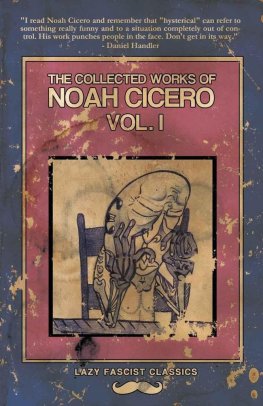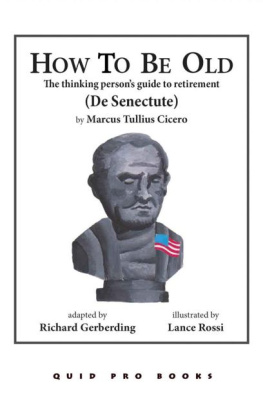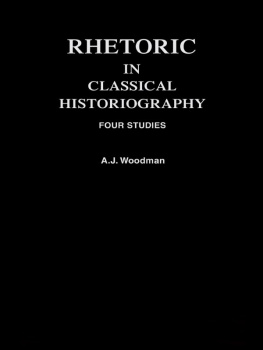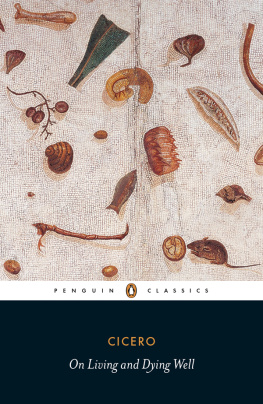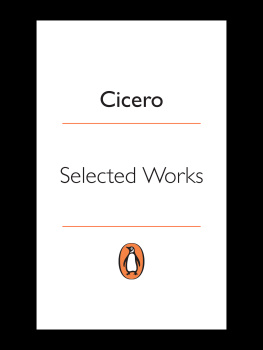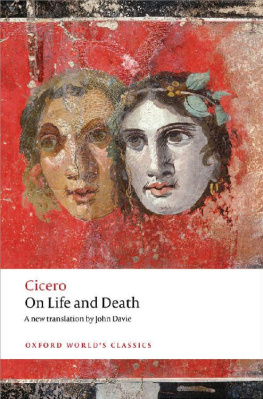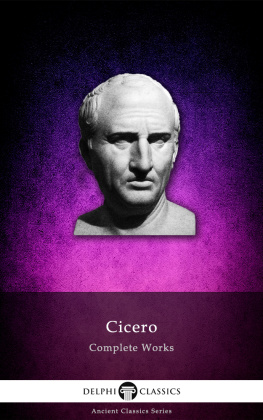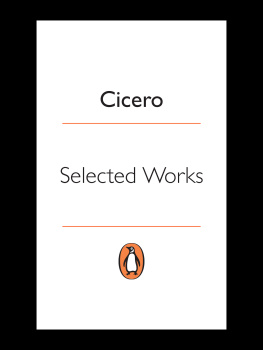Marcus Cicero - Cicero: Selected Letters
Here you can read online Marcus Cicero - Cicero: Selected Letters full text of the book (entire story) in english for free. Download pdf and epub, get meaning, cover and reviews about this ebook. year: 2010, publisher: Penguin Group USA, Inc., genre: Detective and thriller. Description of the work, (preface) as well as reviews are available. Best literature library LitArk.com created for fans of good reading and offers a wide selection of genres:
Romance novel
Science fiction
Adventure
Detective
Science
History
Home and family
Prose
Art
Politics
Computer
Non-fiction
Religion
Business
Children
Humor
Choose a favorite category and find really read worthwhile books. Enjoy immersion in the world of imagination, feel the emotions of the characters or learn something new for yourself, make an fascinating discovery.
- Book:Cicero: Selected Letters
- Author:
- Publisher:Penguin Group USA, Inc.
- Genre:
- Year:2010
- Rating:4 / 5
- Favourites:Add to favourites
- Your mark:
- 80
- 1
- 2
- 3
- 4
- 5
Cicero: Selected Letters: summary, description and annotation
We offer to read an annotation, description, summary or preface (depends on what the author of the book "Cicero: Selected Letters" wrote himself). If you haven't found the necessary information about the book — write in the comments, we will try to find it.
Cicero: Selected Letters — read online for free the complete book (whole text) full work
Below is the text of the book, divided by pages. System saving the place of the last page read, allows you to conveniently read the book "Cicero: Selected Letters" online for free, without having to search again every time where you left off. Put a bookmark, and you can go to the page where you finished reading at any time.
Font size:
Interval:
Bookmark:

SELECTED LETTERS
MARCUS TULLIUS CICERO (10643 BC ), Roman orator and statesman, was born at Arpinum of a wealthy local family. He was taken to Rome for his education with the idea of a public career, and by 70 BC he had established himself as the leading barrister in Rome. In the meantime his political career was well under way and he was elected praetor for the year 66. His ambitious nature enabled him to obtain those honours which would normally only have been conferred upon members of the Roman aristocracy, and he was duly elected consul for 63. One of the most permanent features of his political life was his attachment to Pompey. As a politician his notable quality was his consistent refusal to compromise; as a statesman his ideals were more honourable and unselfish than those of his contemporaries. Cicero was the greatest of the Roman orators, possessing a wide range of technique and an exceptional command of the Latin tongue. He followed the common practice of publishing his speeches, but he also produced a large number of works on the theory and practice of rhetoric, on religion, and on moral and political philosophy. He played a leading part in the development of the Latin hexameter. Perhaps the most interesting of all his works is the collection of 900 letters published posthumously. These not only contain a first-hand account of social and political life in the upper classes at Rome, but also reflect the changing personal feelings of an emotional and sensitive man.
D. R. SHACKLETON BAILEY was born in 1917 and educated at Lancaster Royal Grammar School and at Gonville and Caius College, Cambridge, where he was a Fellow from 1944 to 1955 and again, as Deputy and Senior Bursar, from 1964 to 1968. From 1948 to 1968 he was University Lecturer in Tibetan and from 1955 to 1964 Fellow and Director of Studies in Classics at Jesus College, Cambridge. From 1968 to 1974 he was Professor of Latin at the University of Michigan and from 1975 to 1982 Professor of Greek and Latin at Harvard University. From 1982 to 1988 he was Pope Professor of the Latin Language and Literature at Harvard. Since 1989 he has been Emeritus Professor at the University of Michigan. He is a Doctor of Letters (Cambridge, 1957), a Fellow of the British Academy (1958), and a member of the American Philosophical Society (1977). Among his classical publications are Propertiana (1956), Towards a Text of Cicero ad Atticum (1960), Cicernis Epistulae II.ii (1961), Ciceros Letters to Atticus (19651970), Cicero (1971), Two Studies in Roman Nomenclature (1976), Cicero: Epistulae ad Familiares (1977), Cicero: Epistulae ad Q. Fratrem et M. Brutum (1981), Profile of Horace (1982), Anthologia Latina II (1982), Horatius (1985), Quintilianus: Declamationes minores (1989), Martialis (1990) and Back from Exile (1991).
CICERO
Translated with an Introduction by D. R. Shackleton Bailey

Penguin Books
PENGUIN BOOKS
Published by the Penguin Group
Penguin Books Ltd, 80 Strand, London, WC2R 0RL, England
Penguin Putnam Inc., 375 Hudson Street, New York, New York 10014, USA
Penguin Books Australia Ltd, Ringwood, Victoria, Australia
Penguin Books Canada Ltd, 10 Alcorn Avenue, Toronto, Ontario, Canada M4V 3B2
Penguin Books India (P) Ltd, 11, Community Centre, Panchsheel Park, New Delhi 110 017, India
Penguin Books (NZ) Ltd, Private Bag 102902, NSMC, Auckland, New Zealand
Penguin Books (South Africa) (Pty) Ltd, 5 Watkins Street, Denver Ext 4, Johannesburg 2094, South Africa
Penguin Books Ltd, Registered Offices: 80 Strand, London, WC2R 0RL, England
First published 1986
Except in the United States of America, this book is sold subject to the condition that it shall not, by way of trade or otherwise, be lent, re-sold, hired out, or otherwise circulated without the publishers prior consent in any form of binding or cover other than that in which it is published and without a similar condition including this condition being imposed on the subsequent purchaser
ISBN: 9781101493724
T HIS volume reproduces, with some appropriate modifications, parts of the complete translation of Ciceros correspondence published in the same series in 1978 and now out of print. I have chosen the letters mainly for their intrinsic interest or the glimpses they give of Ciceros personality. Some of them are important historically, but I have not tried to present a conspectus of historical source-material. The translations follow the text of my Cambridge edition (see ).
August, 1982
C ICERO s letters only come fully to life against a historical and biographical background, though a bare outline is all that can be attempted here.
Marcus Tullius Cicero was born on 3 January 106 B.C. at his family home near the hill town of Arpinum (still Arpino) about seventy miles to the east of Rome. For nearly a century the Arpinates had been citizens of Rome, a status attained by most of Italy south of the Po only after the bloody Social War of 9088. The family was old and well-to-do, and like many locally prominent Italian families, had good Roman connections; but from the standpoint of a Roman aristocrat he was a nobody, a new man, a fact of lasting practical and psychological importance.
About ten years after Ciceros birth his father took up residence in a fashionable part of Rome. Cicero and his younger brother received the best education money could buy and he is said to have easily outshone his socially superior classmates. On coming of age at sixteen or seventeen he served for a short time in the Roman army against the insurgent Italian allies. He lived in stormy times. Roman political institutions were turning out to be inadequate for the government of an already large empire. The authority of the Senate, the only permanent governing body, had been seriously shaken in the last three decades of the second century. The career of the great general Marius, also a native of Arpinum and a family connection of the Ciceros, had pointed the way to future army commanders who were to build positions of personal power on the loyalty of their troops.
The Social War was followed by the terrible internal struggles of the eighties. In 88 the Consul Sulla, a brilliant general from an impoverished noble family who combined conservative sympathies with a contempt for constitutional forms, set a fateful precedent by marching his army on the capital in rebuttal of a personal injustice. His chief opponents were killed or, like Marius, escaped into exile. But Sulla had business elsewhere. Later in the year he left for the East to deal with a foreign enemy, the redoubtable Mithridates of Pontus. Turmoil ensued. Rome stood a siege before being captured again by the forces of the anti-Sullan Consul Cinna and old Marius, emerging from banishment like an avenging ghost. The resulting massacre was the bloodiest of its kind so far known in Roman history. Marius died a few months later, but Rome and Italy remained under the control of Cinna and his associates for the next four years.
In 83 Sulla brought his victorious legions home. Fighting followed up and down the peninsula, and Rome had another Marian blood-bath before Sulla came out master of the situation. His ruthless reprisals left a grim memory, but to people of traditional outlook he was the restorer of the Republic. As Dictator he produced a new constitution guaranteeing control of affairs to an enlarged Senate, and, this task completed, he retired voluntarily into private life (79). His work was not wholly undone for thirty years.
Next pageFont size:
Interval:
Bookmark:
Similar books «Cicero: Selected Letters»
Look at similar books to Cicero: Selected Letters. We have selected literature similar in name and meaning in the hope of providing readers with more options to find new, interesting, not yet read works.
Discussion, reviews of the book Cicero: Selected Letters and just readers' own opinions. Leave your comments, write what you think about the work, its meaning or the main characters. Specify what exactly you liked and what you didn't like, and why you think so.


